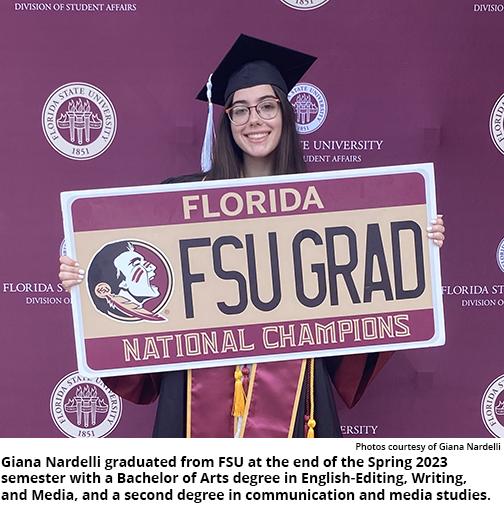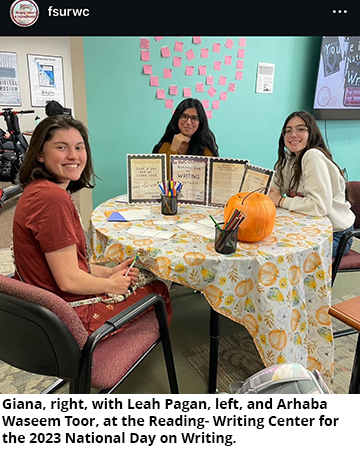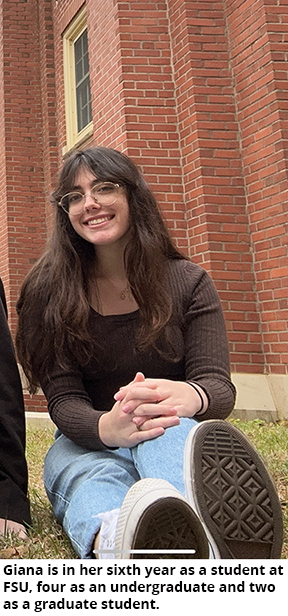Giana Nardelli, master's student in Rhetoric and Composition, has taken full advantage of what the English department offers
By Olivia Brooks
One way to get to know Florida State University’s English department is to know the students who dedicate endless hours in the Williams Building to their studying, working on research, and, of course, writing.
Giana Nardelli is a second-year master’s student in the department’s Rhetoric and Composition Program, but this is her sixth year as a student at FSU. With her undergraduate degree in English-Editing, Writing, and Media, Nardelli has built a solid foundation in the English department.
“I loved EWM—I can’t talk about it enough,” she says.
Nardelli earned a second undergraduate major in communication and media studies, and her enthusiasm toward being part of the university community is clear. When she began researching universities in high school, she knew FSU—and the English department—was the place for her to further her education.
“FSU stood out to me because of its amazing English program,” Nardelli says. “I toured every public university in the state and did not find an English department that stood out as well as the one we have here did—especially since Florida State has so many different programs. Here, English feels really respected.”
As a graduate student, Nardelli has taught ENC2135: Research, Genre, and Context through the English department’s College Composition Program, and she has worked as a writing tutor in the Reading-Writing Center. She also is the 2024-25 coordinator for the English department’s 16th-annual Digital Symposium, which takes place near the end of the Spring 2025 semester.
Those experiences bring out her personality and engagement with faculty members and students alike in the department.
“Giana is very smart but unpretentious, and she's not the first person to talk in class, but when she speaks, it's always thoughtful and valuable,” says English Associate Professor Michael Neal, who was chair of the Rhetoric and Composition Program during the 2023-24 academic year. “Even though teaching is new to her, I get the sense that her students are very fortunate to have her as their instructor.”
Nardelli stayed involved in the department during her time as an undergraduate. She participated in an internship with Media Specialist Jack Clifford, where she learned about journalism, news writing, and interviewing people. Here, she learned invaluable skills and got a good history lesson of the department in the process.
 “Giana is a great writer and a dedicated journalist,” says Clifford, who worked with Nardelli in the Spring 2023 semester. “Whether I needed an in-depth profile of someone connected to the department or a quick article about an event going on in the department, Giana always produced outstanding work. I’m glad she decided on our Rhetoric and Composition Program for her graduate studies.”
“Giana is a great writer and a dedicated journalist,” says Clifford, who worked with Nardelli in the Spring 2023 semester. “Whether I needed an in-depth profile of someone connected to the department or a quick article about an event going on in the department, Giana always produced outstanding work. I’m glad she decided on our Rhetoric and Composition Program for her graduate studies.”
Through her article assignments, Nardelli partnered with the Jerome Stern Reading Series, which brought her a deeper understanding of just how much the department tries to make each student’s experience holistic and positive.
For example, her article about award-winning author Manuel Muñoz’ Spring 2023 visit to FSU spotlighted the collaborative efforts of FSU’s Creative Writing Program, the Jerome Stern Reading Series coordinators, and editors for the Southeast Review, a national literary magazine run by English graduate students that publishes literary fiction, creative nonfiction, poetry, interviews, book reviews, and art.
In the article, Nardelli focuses on Muñoz’ time spent with students and centers the article on his publications and achievements.
The creative way of weaving a narrative in a fluent, communicative way is a specialty of Nardelli’s.
“My internship—and especially my collaborative experiences with the group I worked with—really helped me to grow my writing skills,” Nardelli says. “I went from having an admiration for journalism and journalistic writing to being able to actually picture myself doing that as a career. Also, I think a really valuable part of journalism is learning how to conduct interviews that feel more like conversations—because, really, that’s what they are, but being able to make it feel personal is important for building relationships with people.
“This was a great experience, and I was able to get a glimpse into the world of the Southeast Review, which I work with now as an assistant nonfiction editor.”
The EWM courses Nardelli took as an undergraduate also gave her a huge boost in confidence and aided her in navigating the next steps to graduate school. Specifically, she mentions how the Writing and Editing in Print and Online course helped her.
“It was during [the pandemic],” she says, “and it was the first time I took genre composing seriously.”
The validation and encouragement she earned on projects in the class steered her toward wanting to pursue work in directed choices, purposeful composing, and rhetoric. This course was also a steppingstone for her post-graduation decision, eventually choosing the Rhetoric and Composition Program.
“I was so pleased and happy with my experience with FSU English that I was like ‘there is no other place I can really see myself doing a master’s degree,’” Nardelli says.
Now that she is in the thick of her studies, Nardelli cannot imagine herself being anywhere else. She broadens her appreciation of FSU to Tallahassee, saying the city grows on you. She loves the culture, environment, and community of both.
Being a student in the Rhetoric and Composition Program has only strengthened her appreciation for the area.
“It involves a lot about the purposeful and deliberate choices we make in communicating, talking about rhetoric more than just persuasion, it’s all around us,” Nardelli says, “In the field of composition as well with its first-year composition program, which is one of FSU’s crown jewels. It’s a very structured program but offers a lot of freedom as well in making your own arguments, theories, and discoveries.”
The structure, Nardelli adds, is great for students because they start with the basics, such as rhetorical theory and research methods. With her experience in those subjects as an undergraduate, she can vouch for how important those foundational courses were for learning to properly research, leading into the more complex foundational courses she takes now, including theories of composition.
“Giana is one of the unflappable personalities in our program,” Neal says. “She's not afraid of new challenges, and she's resourceful, so I know she'll figure out the best way to get different tasks done.”
Many of Nardelli’s mentors now also were master’s or doctoral students in the Rhetoric and Composition Program. She says she could praise them “forever.” Most importantly, Nardelli’s graduate student cohort is small yet mighty, and she loves it that way.
“We are close and can talk about our theories and we can all get really passionate about what each other is doing,” she says.
Nardelli’s advice for graduate students who earned their undergraduate degree at the same university is to separate the experiences.
“Don’t think of graduate school as ‘Undergrad Part 2,’” she says.
She emphasizes that graduate school is a different environment and culture, from the classroom discussions to the community that surrounds the students. The professors’ involvement and coursework are distinct as well, she adds.
Nardelli’s presence in the English department has been a spark of light, for her and for those around her. With less than one year of her master’s program left, Nardelli is an engaging and encouraging figure to meet and talk with in the Williams Building.
Olivia Brooks graduated from FSU at the end of the Spring 2024 semester with her Bachelor of Arts degree from FSU in English-Editing, Writing, and Media, and a minor in communication. She is currently in her first year as a master's student in FSU's Rhetoric and Composition Program.
Follow the English department on Instagram; on Facebook; and on X.
